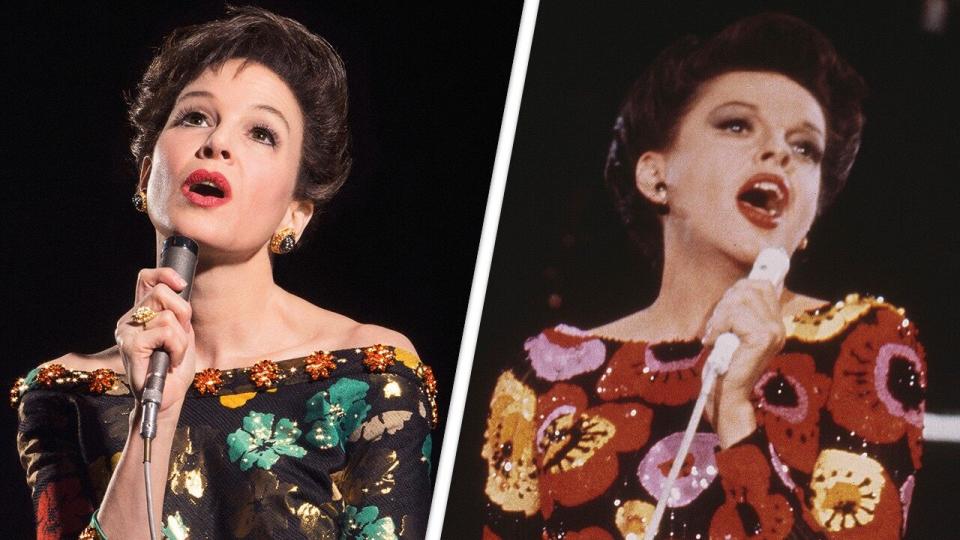The True Story of 'Judy': Real Life vs. The Movie
The biopic Judy unfolds over six weeks in 1968 and '69, a snapshot of the world's greatest entertainer in the final year of her life. Based on Peter Quilter's Tony-nominated Broadway show, End of the Rainbow, the film sees Judy Garland (played by Renée Zellweger) through one last run of performances, a fifth and final marriage, and devotion to her children, while also flashing back to Judy's own days as a child star.
The movie (out now) serves as many things: A character study about the highs and lows that made Judy Garland who she was, a portrait of the golden age of the studio system with appearances from the likes of Mickey Rooney and Ava Gardner, and a crash course in essential Judy: From The Wizard of Oz and "Over the Rainbow" to "The Trolley Song" and her lifelong love of vaudeville. For those readers wanting to differentiate between fact and fiction, here's a map to the stars, struggles and stage shows in Judy.
THE LEGEND
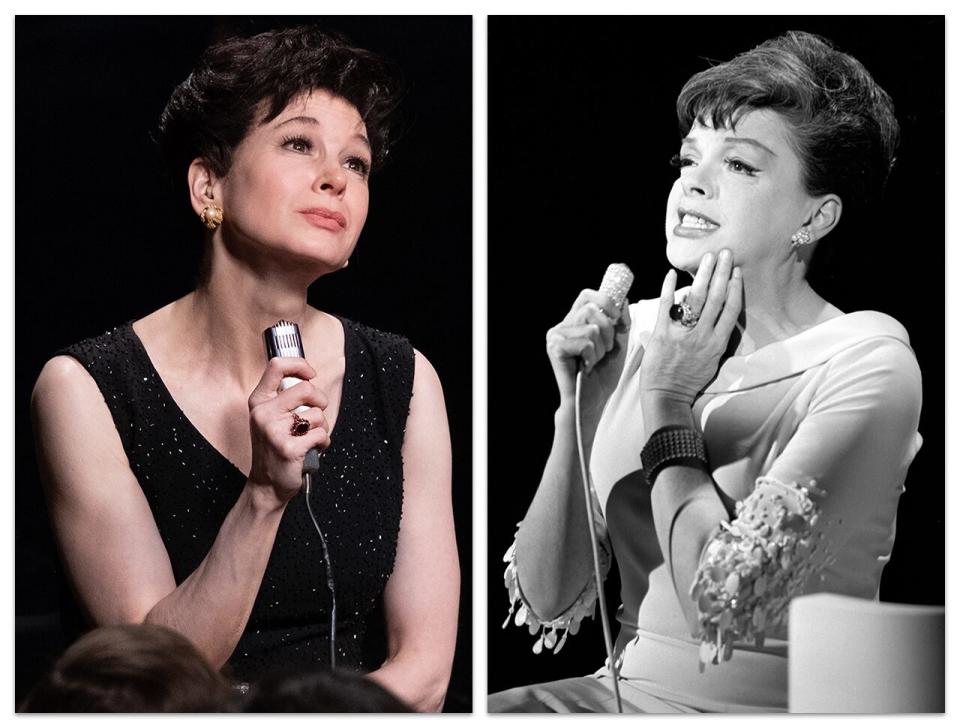
In real life: By 1968, Garland was a GRAMMY winner, had been nominated for two Oscars -- for A Star Is Born in 1955 and Judgment at Nuremberg in 1962 -- and won a Golden Globe for the former. (She also received the Cecil B. DeMille Award in 1962.) Her final film role was in the 1963 musical, I Could Go on Singing, though she continued to perform onstage in subsequent years. "I'm always being painted a more tragic figure than I am," Garland said. "Actually, I get awfully bored with myself as a tragic figure."
In the movie: Judy doesn't exactly dwell on the tragedies of Garland's life, but they're there: The financial struggles and debts, the bad press, the industry folk refusing to work with her because she was deemed too difficult. It's the impetus for her to book shows in London -- where it's deemed she's still loved -- to earn enough money to support her children. Throughout it all, however, the movie makes clear why she is beloved by her adoring fans and fellow musicians: Her talent.
THE CHILD STAR
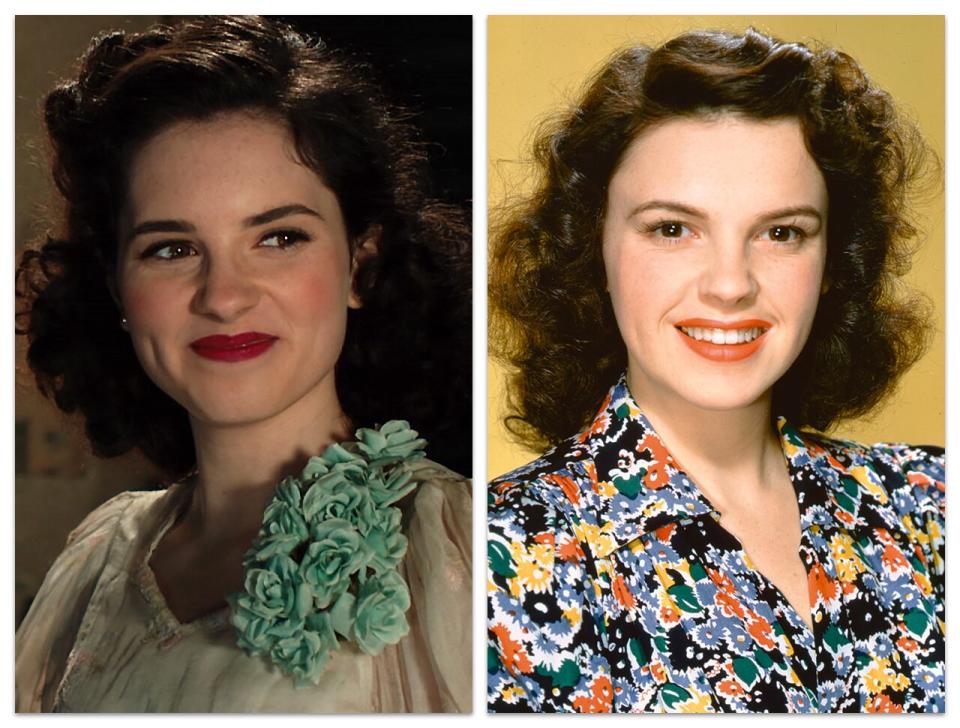
In real life: Born Frances Gumm, she changed her name to Judy at age 11 and signed to Metro-Goldwyn-Mayer at 13. She was best known for playing Dorothy Gale in The Wizard of Oz and starring alongside lifelong friend Mickey Rooney, for which she was honored at the 1940 Oscars. Behind the scenes, however, MGM proved especially cruel to Garland, who suffered grueling filming schedules, was forced to diet, given amphetamines, and according to biographer Gerald Clarke, was molested by MGM studio boss Louis B. Mayer.
"My mother was truly a stage mother. A mean one," she said in a 1967 interview. "She was very jealous, because she had absolutely no talent...She would stand in the wings when I was a little girl and if I didn't feel good, if I was sick to my tummy, she would say, 'You get out and sing or I'll wrap you around the bedpost and break you off short!' So I'd go out and sing."
In the movie: Sixteen-year-old Garland (Darci Shaw), struggling with the demands of filming Wizard of Oz, wants to take a break to experience normal life, though she is manipulated by Louis B. Mayer (Richard Cordery) to comply when he threatens to take away her career and convinces her that there are countless girls in the world who are prettier and more talented. He is a looming, intimidating figure in young Garland's life, though the movie only insinuates any sexual abuse.
Throughout the production, Garland is given pills to stay awake and pills to sleep, deprived food, pitted against fellow child star Shirley Temple and sent on studio-arranged dates with Mickey Rooney (Gus Barry) for publicity. (Her actual feelings for Rooney go unrequited, as it's said they did in real life.) But we see Garland rebelling too, biting into a cheeseburger even as she's told no one wants to see a fat Dorothy and jumping into a swimming pool in costume during an on-set sweet 16.
THE FIFTH HUSBAND
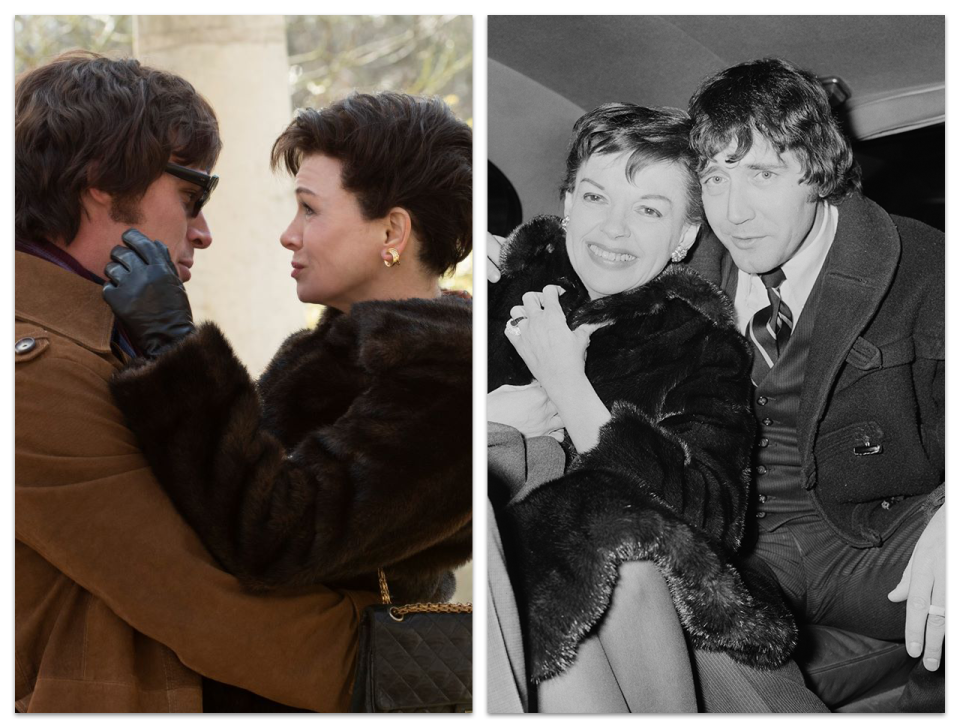
In real life: Her fifth and final husband (after composer David Rose, director Vincente Minnelli, Sid Luft and actor Mark Herron), Mickey Deans was 12 years her junior. Deans wrote in his 1972 autobiography, Weep No More, My Lady, that he met Garland in 1966 when he delivered stimulants to her at her hotel in New York. An entrepreneur, musician and one-time discotheque owner, he was working as Garland's manager when she booked her London shows, eventually proposing to her in '69 and marrying her the same year.
Rosalyn Wilder, who worked closely with Garland during her time in London, has called him a "dreadful man" and said, "If she put an advert in a newspaper for the most unsuitable person to take care of her, she wouldn’t have had a better response."
In the movie: Garland meets Deans (Finn Wittrock) at a party in the Hollywood Hills and he later shows up at her London hotel, to her surprised delight. As they grow closer, he involves himself with her business dealings and attempts to partner her with a chain of cinemas to open Judy Garland Picture Houses. She eventually proposes to him and they are married. (Their wedding costumes are spot-on to real life.) The movie doesn't shy away from the couple's notoriously nasty fights or Deans' reputation as an enabler, though Judy does seem to imply that Garland kicked him to the curb in the end, which didn't happen as definitively in real life.
THE SHOWBIZ KIDS
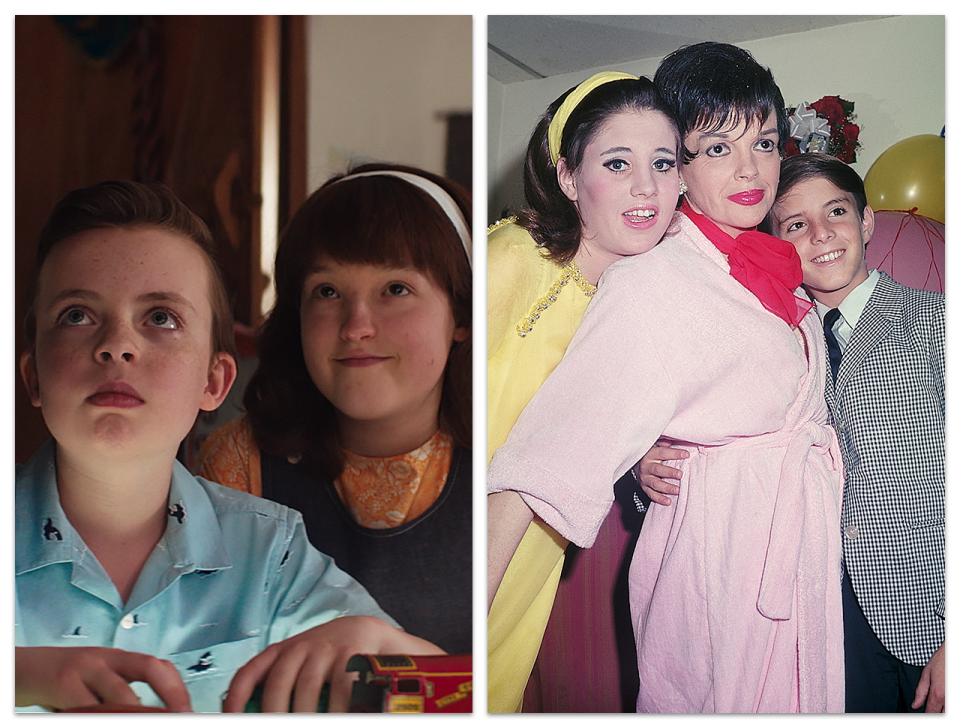
In real life: Garland's eldest daughter is Liza Minnelli, who was a star in her own right by 1968. (Ahead of Judy's release, Minnelli said she did "not approve nor sanction" the film.) Garland gave birth to another daughter and a son during her marriage to Sid Luft: Lorna and Joey, who were 16 and 13, respectively, in '68. The two often performed onstage with their mother, with Lorna singing and Joey playing the drums. At the time of her death, Lorna and Joey lived in Los Angeles with their father.
In the movie: Liza (played by Gemma-Leah Devereux) makes a brief appearance early on in the movie, chatting with her mother at a house party before leaving to attend a different party with Andy Warhol. Instead, the movie focuses on her relationship with Lorna (Bella Ramsey, aka Game of Thrones' Lyanna Mormont) and Joey (Lewin Lloyd), who first appear singing alongside Garland in a small stage show. While Garland set out to London in hopes of making enough money to support her children, in the end, she does ultimately accept that they are happier living with the stability their father, Sid (Rufus Sewell), provides.
THE TALK OF THE TOWN
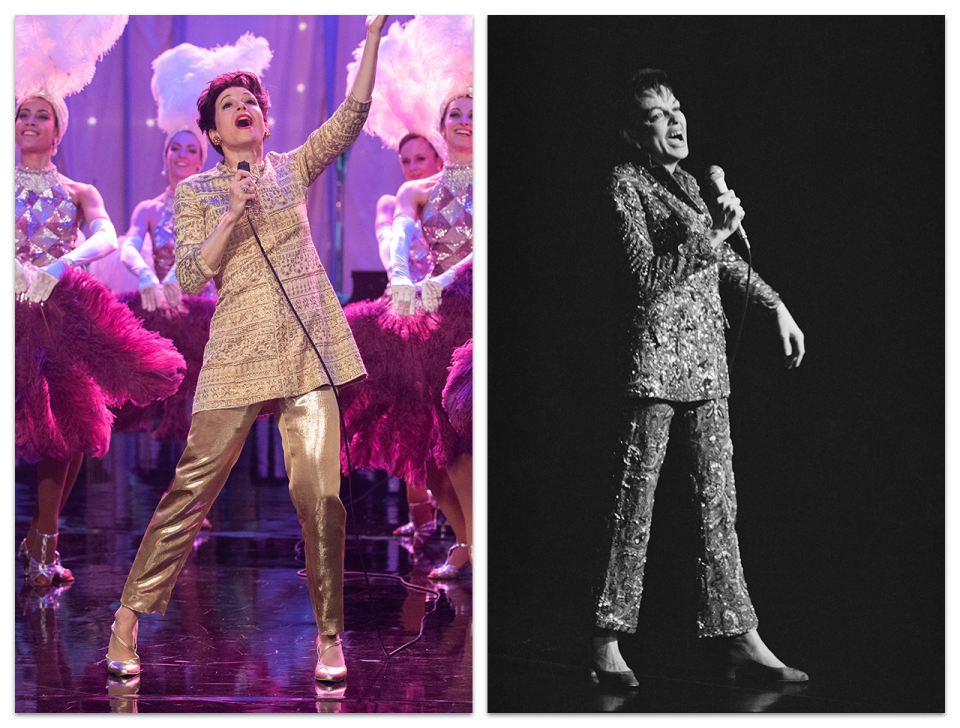
In real life: Garland went abroad to stage a comeback with a five-week run of performances at London's The Talk of the Town nightclub. "She did sometimes come in a little bit late and do a reasonably good show, and that was fine," former production assistant Rosalyn Wilder has said. But as Garland struggled with addiction and her ailing health, "There were too many nights when she just didn’t come in at all. Or she came in terribly late, by which time the goodwill of the audience had largely disappeared." (Instead, the theater would put on skiffle singer Lonnie Donegan, who was next on their bill.)
During one performance, according to Garland's obituary in The Los Angeles Times, "an audience hurled bread, rolls and glasses at her after she kept them waiting for an hour."
In the movie: Despite initial jitters and begging for the show to be canceled, Garland makes a barnstorming debut at Talk of the Town. The show is met with general acclaim by critics and fans -- the rare nights she shows up too drunk to perform aside. Throughout it all, her handler, Rosalyn Wilder (Wild Rose's Jessie Buckley), is at Garland's side, sobering her up and encouraging her onstage, lest she be replaced by Lonnie Donegan (John Dagleish). (To which Garland snaps back, "He's a peach of a man, but he can go f**k himself if he thinks he's taking my billing.")
Following a particularly disastrous performance -- during which the audience throws dinner rolls at Garland -- the theater cancels the remainder of her run, though she shows up asking to perform a final song. She is resplendent. Midway through an encore of "Over the Rainbow," overcome with emotion, Garland's voice falters and the audience takes over, her adoring public singing the song back to her. Sadly, it seems this happy ending was only in the movies.
RELATED CONTENT:
'Judy' Director Responds to Liza Minnelli's Concerns About the Biopic (Exclusive)
Renee Zellweger Opens Up About Blazing Her Own Trail in Hollywood (Exclusive)
Renee Zellweger Reveals Her Biggest Struggle While Transforming Into Judy Garland (Exclusive)
Related Articles:
